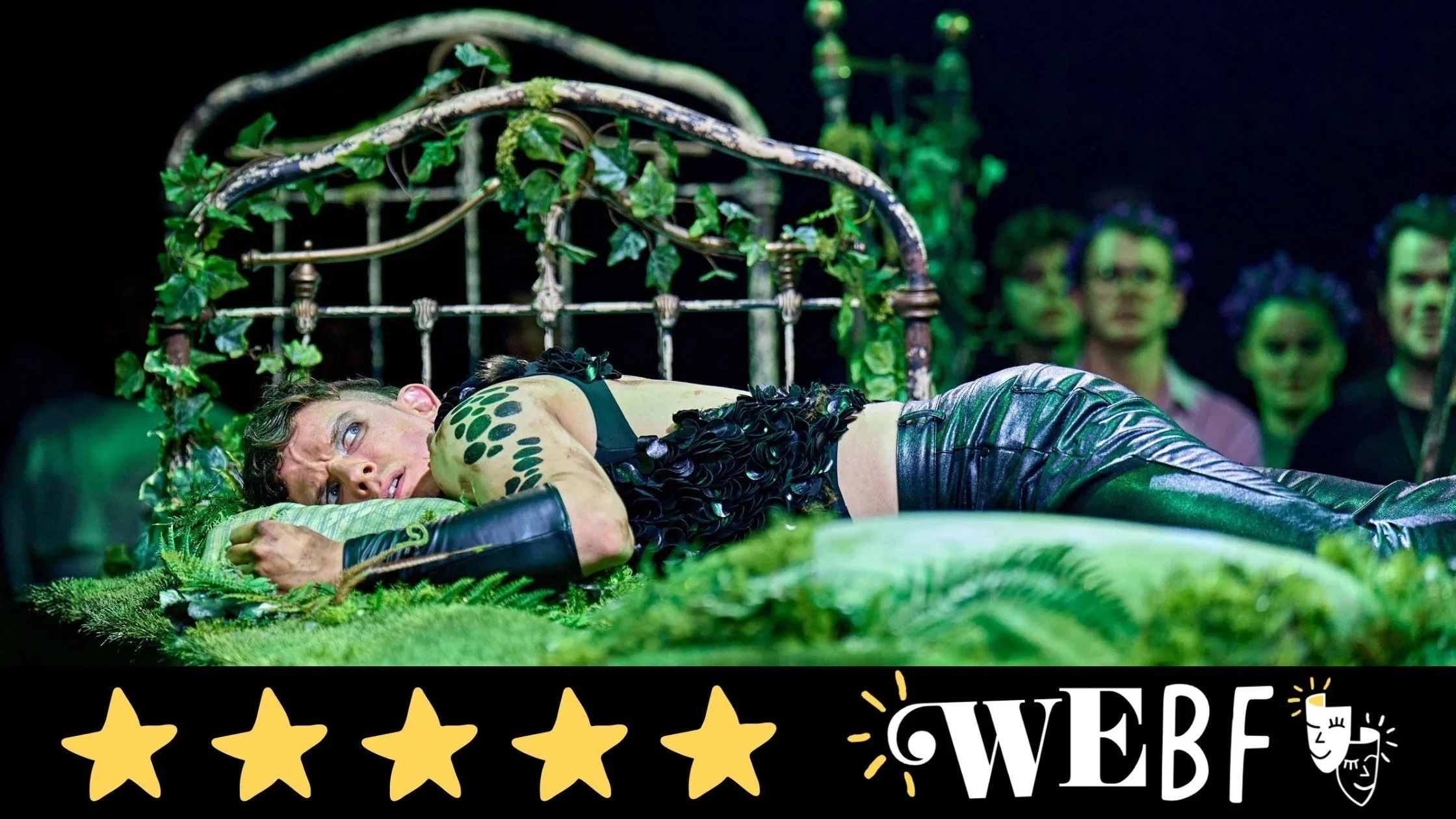Review: A MIDSUMMER NIGHT’S DREAM, Bridge Theatre
Photo credit: Manuel Harlan
Hermia is betrothed to Demitrius but she’s in love with Lysander. When Theseus, Duke of Athens makes the decree that Hermia should marry Demetrius or die, Hermia and Lysander decide to run away to the forest to Elope. Meanwhile, Dimitrius begins the search for Hermia in the forest, whilst pursued by Helena, who he does not love. The fairy Queen Titania, who resides in the forest, has fallen out with her husband Oberon and has a plan to mess with him by getting the notoriously mischievous Puck to put a love potion in his eyes to make him fall in love with the first thing he sees…
The play was written by William Shakespeare and published in 1600 (scholars are still in debate over the exact date the play was written). This production of the play was initially performed in 2019 to great success and now returns, with some new cast members, for a limited run at Bridge Theatre.
Given that this play has been performed hundreds of times, it can be hard to find a version with a really fresh interpretation of the story. This production has an imaginative vision and goes for it. Instead of a naturalistic/realistic forest set, production designer Bunny Christie goes for a more inspired-by aesthetic. Green grass-like floor, which has parts that are covered in moss and stones, covers the rising and falling stage pieces and beds are designed to look wooden and fairy-like. Very much like Pixie Hollow come to life.
The costumes are stunning. Mortals are mostly adorned in more traditional fabrics with a drab colour pallette, whilst fairies are covered in brightly coloured flowers, glitter and feathers. Given this, there is a sense that Hyppolyta and Titania are interconnected, much like a changeling (and much like Puck), due to the fact that these costumes have aspects of both worlds. Additionally, Bottom’s donkey costume is absolutely genius in its minimalism: donkey ears attached to a beanie.
Its worth noting the attention to detail in the design. In particular, the flower to create the love potion is bright purple, standing out starkly amongst everything else, and the flower used to break the spell is white, giving it an almost monochrome quality associated with lifelessness.
Nicholas Hytner is a stunning director. Beginning the show with Hyppolyta in a box is one hell of a statement, showing the passionate rage and desperation within the women who were seemingly powerless over their fates during the time that they were living in. The epitome of the trophy wife banging on the glass to be set free. We love the idea that Titania is her alter-ego, who can (and does) set herself free and make an attempt to teach the patriarchy a lesson whilst doing it.
Arguably the most memorable aspect of the show is the fact that the fairies are further distinguished from the mortals through the use of aerial silk stunts. This negates the need for wings, giving them an other-worldly grace combined with sprite like energy. We love that this is used effectively to demonstrate the idea of them listening in on the mortals and affecting them without being seen.
We particularly enjoy the fact that violence is left to hand to hand combat, to such an extent that no weapons are directly used. The leaving out of potentially graphic, Shakespearean violence makes way for significantly heightened comedy. The fight scenes between Demetrius and Lysander look childish in a good way and are ridiculously funny to watch, especially given that there are breaks within the fights to allow them to desperately attempt to win over Helena with their ‘manliness’ and chivalric natures.
It must be said that this show is very camp in the best way. The campness and willingness to embrace sexual freedom really heightens the hilarity of Puck and Titania’s shenanigans and shows off the strength of the love potion flower. There is a point when the flower gets so close to Lysander and Demetrius during one of their fights that they end up passionately kissing each other as a result. Although the real stand out moments are within Oberon’s infatuation with Bottom, resulting in a lot of sexual tension and humour as a result of this. We never thought we’d see Bottom as a donkey flirting with Oberon in a bubble bath and we are here for it!
The cast is incredibly strong, to the extent that its hard to pick a particularly stand out actor. JJ Feild’s ability to switch between his vastly different characterisations of his characters (Oberon and Theseus) is staggering, Susanna Fielding, who plays Titania and Hyppolyta, is powerfully grounded yet ethereal, and Emmanuel Akwafo’s (Bottom) comic timing and ability to command a stage is second to none.
Yet it must be said that David Moorst’s interpretation of Puck is by far the most interesting and captivating we’ve seen to date. He portrays Puck as the most powerful being there is, who’s as careless with mortals as he is with the fairies. There’s something about him that’s unsettling yet its hard to quite place what this is given how charismatic he is.
Moorst is a talented aerialist and makes these stunts look effortless. At times, his physicality has an almost whimsical quality to it and at others, it’s almost animalistic. His voice with the way it bounces and trails off, almost sounding like mischievous laughter, echoes in our minds long after we’ve left the venue. Moorst has certainly mastered the art of obscurity.
Pacy and energetic, chaotic and exciting, whilst bringing together all the best parts of fantasy and childhood imagination. A testament to true love and embracing of all sexual and gender identities. The best fun and so uplifting, definitely a show that is very needed right now.
***** Five stars
Reviewed by: Megan O’Neill
A Midsummer Night’s Dream plays at London’s Bridge Theatre until 23 August, with further info here.


